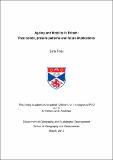Ageing and mobility in Britain : past trends, present patterns and future implications
Abstract
Over the next decade the ‘Baby Boomer’ cohort will increasingly contribute to the proportion
of those aged 60 and over in Britain. The issue of how the mobility of older people has
changed for different cohort groups has not been considered in a historical context. Ryder
(1965) argued that cohort groups could be important in determining behaviour as have other
social structural factors, such as socioeconomic status. This thesis merges the disciplines of
transport geography and population studies using a novel approach of cohort analysis, which
has not been used widely for studying mobility trends.
Using National Travel Survey data from 1995-2008, the mobility trends of older people in
Britain are explored by creating pseudo cohorts. Pseudo cohorts are artificially created
datasets which are constructed from using repeated cross-sectional data (McIntosh, 2005,
Uren, 2006). This technique can differentiate ‘age’, ‘period’ and ‘cohort’ effects in mobility
trends. Age effects are differences in behaviour between age groups i.e. changes in mobility
associated with age itself. Period effects relate to changes in behaviour in all age groups over
a period of time. Cohort effects are those associated with behaviour common to particular
groups born around the same time (Glenn, 2005, Yang, 2007).
The influence of the Scottish concessionary travel policy on the mobility of older people at the
aggregate level is also considered using Scottish Household Survey data from 1999-2008.
This policy is very blunt and based on assumptions about older age. As cohorts differ, these
assumptions may no longer hold and therefore the policy may not be effective.
This thesis argues, using a longitudinal demographic perspective, that structural effects shape
mobility of cohorts differently over time. The findings reveal although mobility amongst older
people is rising in general, there would actually be declining mobility were it not for the
Boomer cohort. Amongst younger cohorts mobility is lower. The analysis also shows that
women travel further than men, a fundamental break with the past, specific to this generation.
This thesis illustrates the importance of cohort membership in explaining mobility change.
Type
Thesis, PhD Doctor of Philosophy
Collections
Items in the St Andrews Research Repository are protected by copyright, with all rights reserved, unless otherwise indicated.

